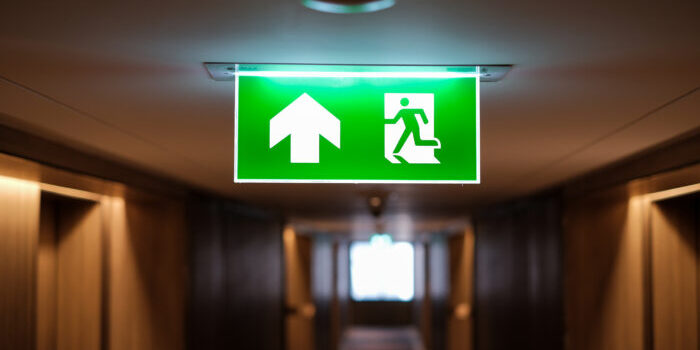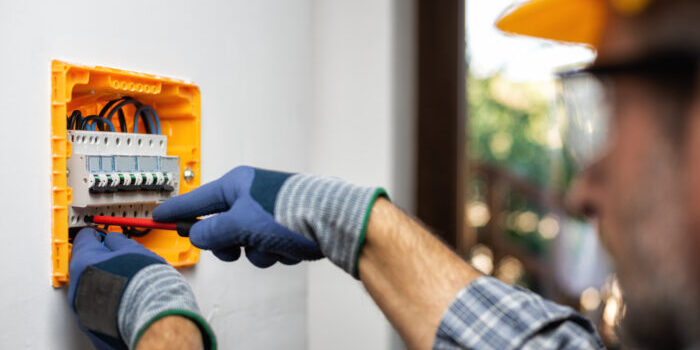Safe Evacuation in an Emergency
Emergency lights are designed to help occupants exit the building safely in a major emergency, which is why having them tested on a regular basis is important.
Stay Compliant with Building Regulations
AS/NZS 2293 provides recommendations for emergency light design, installation, maintenance and testing, helping building managers and employers stay compliant.
Keep Your Workforce Protected
We help ensure your exit lights are working in the event of a fire. This helps to protect your workforce by reducing their risk of injury and saving lives.
Types of Emergency Lights
Emergency exit lights come in three main types: sustained, non-maintained and maintained exit lights. They are designed to help occupants get out of the building safely in an emergency and are typically tested every six months.
01.
Sustained
Sustained exit lights have two bulbs, with one working at any one time. One lamp is connected to the 240V mains. The other only activates during a power failure.
02.
Non-Maintained
Non-maintained exit lights are constantly on charge and usually illuminate when the power goes off.
03.
Maintained
Maintained exit lights are powered by both regular power and a battery backup. The battery backup turns on when the main power fails.
Why Emergency Lighting is Important?
In case of a fire, emergency or major power failure, safe evacuation is vital. For this reason, it is ideal for employers and building managers to ensure emergency lights are visible and functional.
01.
Requirement for Emergency Lights on Every Building Floor
The Building Code of Australia recommends emergency lights on each storey of a building with over 300m2 in floor space for safer evacuation.
02.
Ensures Proper View of Exits in An Emergency
According to AS/NZS 2293, exit and emergency signs and lights are expected to be illuminated for at least 90 minutes, so exits are easily identifiable.
03.
Makes Evacuation Easier and Safer
When there's no daylight or exit lighting, it can be difficult to find your way out in an emergency. Emergency lights make evacuation easier and safer.
Our Emergency Light Testing Services
Inspection of All Lights and Exit Signs
In accordance with AS2293.2, we can perform emergency light tests every 6 months. Every 12 months, the test will include the same procedures as the 6-month test in addition to cleaning reflective surfaces, fixtures and fittings.
Discharge Tests
During the inspection, our technician will turn off the emergency light battery charge and power for 90 minutes, thus allowing us to isolate and pinpoint any potential power failures that may affect your system.
Ensure Replacement Fittings Match Design
If any replacement fittings are installed, our qualified experts will inspect and test them. We'll ensure all replacement lights match the spacing and design requirements of the original light.
Review and Maintenance of Previous Service Records
We will review previous service records to check that previous defects identified have been fixed. We also store detailed records for any future needs.
Why Choose Precision Test and Tag?
Precision Test and Tag is committed to providing consistent, high-quality service and 100% customer satisfaction to Sydney businesses since 2013. We provide detailed information and are always happy to answer your queries.

Licensed and Qualified for a Safe and Efficient Job
We are trained, licensed and qualified to perform all kinds of emergency and exit light testing, making sure they perform efficiently when needed.
Detailed Testing of Different Electrical and Business Devices
We are electrical test and tag specialists in Sydney. We can test microwave ovens, fire extinguishers, electrical devices, portable RCDs and much more.


Regular Testing Equipment Checks for Complete Accuracy
We use specialised testing equipment and regularly check our own testing equipment to ensure complete accuracy of recordings during the inspection.
